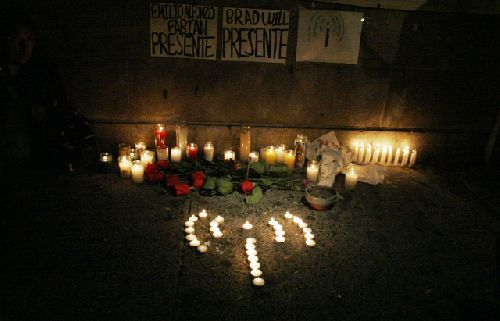Chicago Indymedia : http://chicago.indymedia.org/archive
LOCAL News :: Miscellaneous
Friends of Murdered IMC Journalist Brad Will Demand Hold on Mexico Military Aid
October 27th marks the one year anniversary of the brutal murder of Indymedia journalist Brad Will in Oaxaca, Mexico.

The Friends of Brad Will, a network of friends and associates of Brad Will, the U.S. journalist, have urged House Speaker Pelosi and Eliot Engels, the Chair of the Western Hemispheric affairs subcommittee to oppose U.S. support for Mexican military and police forces. Mr. Will, the 36 year old reporter, was murdered in Oaxaca, Mexico a year ago, on October 27th, 2006. Witnesses and photographic evidence implicate members of the Mexican government, including a police chief.
On 10-21-07, President Bush announced a $1.5 billion dollar “security cooperationinitiative” proposal for Mexico that the President tucked into the Iraq supplemental spending package submitted to Congress. The initiative allows sharing of U.S. military intelligence information with Mexican military counterparts and provides weaponry and training with the notoriously corrupt and brutal Mexican military and police.
Brad Will’s family and friends denounced plans to fund a “Plan Mexico” that would be more costly than the controversial “Plan Colombia” while in attendance at the 10-25-07 hearing. They pointed to the lack of any credible investigation into the murder of the U.S. journalist, who was in Mexico covering the protests of a popular movement of teachers and their supporters facing paramilitary violence deployed by the Mexican government and the governor of Oaxaca, Ulises Ruiz Ortiz.
“One year after the murder of Brad Will, no one has been arrested. Under the guise of stopping drug trafficking, US taxpayers could be funding human rights violations, corrupt local officials and Blackwater-style mercenaries in Oaxaca and elsewhere. This is exactly the wrong message to send at this time.” said Harry Bubbins, a media representative for Friends of Brad Will.
Friends of Brad Will drew attention to testimony from today’s panelist Jess T. Ford, Associate Director, International Relations and Trade Issues, made over ten years ago on September 12, 1996. “Overall, U.S. and Mexican interdiction efforts have had little, if any, impact on the overall flow of drugs through Mexico into the United States. According to U.S. officials, Mexican counter-narcotics efforts are hampered by pervasive corruption of key institutions…”. Since then human right’s abuses and the use of weaponry against civilians has only increased, making this aid proposal inappropriate.
“We are confident that Congress will ask hard questions about the murder of US reporter Brad Will, and not just rubber stamp this military aid package that could lead to further human rights abuses.” stated Robert Jereski, a Congressional liaison for Friends of Brad Will.
The human rights certification processes that have been an important component to these military aid packages in order to gain support in Congress have been entirely inadequate, Friends of Brad Will maintained. According to Human Rights News , ‘Plan Mexico’ - Lessons learned from the failure of ‘Plan Colombia’, President Bush signed Public Law (P.L.) 107-115, which authorized $380.5 million in aid to Colombia. The bulk of this aid was for Colombia’s military. Support for human rights motivated Congress to condition assistance on clear progress in stopping abuses.
Before making a decision on Colombia’s compliance with U.S. law, the Secretary of State must consult with human rights organizations. Amnesty International, Human Rights Watch, and the Washington Office on Latin America (WOLA) (who testified today) met with State Department officials on February 1, 2002 to present evidence that Colombia had not met any of the conditions. Nevertheless, the U.S. certified Colombia, thereby releasing funds. This sent a harmful message to Colombia and particularly the armed forces that human rights are not important. The U.S. would be making the same mistake by approving “Plan Mexico” and sending a message of impunity without first achieving substantial progress in the murder of Brad Will, and other human rights violations.
Garry Leech, an independent journalist who has covered the effects of Plan Colombia, declared that ‘drug war’ program an expensive failure. “The Colombian state’s direct role in human rights abuses such as extra-judicial executions, arbitrary arrests and disappearances has increased under Plan Colombia.” What is needed, he added, is to strengthen judicial institutions and respect for human rights in Mexico, and cut drug demand in and weapons flow from the United States.
Activists with Friends of Brad Will were present at Sub-Committee on the Western Hemisphere Hearing on October 25th and suggested questions for the Representatives to ask the Administration and the panelists:
www.friendsofbradwill.org AND www.bradwill.org
Information Library
Views
Search
Account Login
Media Centers
- worcester
- western mass
- vermont
- urbana-champaign
- tennessee
- tampa bay
- seattle
- sarasota
- santa cruz, ca
- santa barbara
- san francisco bay area
- san francisco
- san diego
- saint louis
- rogue valley
- rochester
- richmond
- portland
- pittsburgh
- philadelphia
- oklahoma
- nyc
- north texas
- north carolina
- new orleans
- new mexico
- new hampshire
- minneapolis/st. paul
- milwaukee
- michigan
- miami
- maine
- madison
- la
- kansas city
- hudson mohawk
- houston
- hawaii
- dc
- columbus
- colorado
- cleveland
- chicago
- charlottesville
- buffalo
- boston
- binghamton
- big muddy
- baltimore
- austin indymedia
- austin
- atlanta
- asheville
- arkansas
- arizona
- valencia
- united kingdom
- ukraine
- toulouse
- toscana
- torun
- switzerland
- sverige
- scotland
- sardegna
- russia
- romania
- roma
- portugal
- poland
- piemonte
- patras
- paris/Île-de-france
- oost-vlaanderen
- nottingham
- norway
- northern england
- nice
- netherlands
- napoli
- nantes
- marseille
- malta
- madrid
- london
- lombardia
- linksunten
- lille
- liguria
- liege
- la plana
- italy
- istanbul
- ireland
- hungary
- grenoble
- germany
- galiza
- euskal herria
- estrecho / madiaq
- emilia-romagna
- cyprus
- croatia
- calabria
- bulgaria
- brussels
- bristol
- belgrade
- belgium
- belarus
- barcelona
- austria
- athens
- armenia
- antwerpen
- andorra
- alacant
- abruzzo
This site made manifest by dadaIMC software




